- Home
- Roxane Gay
Difficult Women Page 14
Difficult Women Read online
Page 14
Mickey visited his mother every Monday for dinner and a few hours of television, contemplation, her complaining, and, inevitably, prayer. After he started seeing Rebekah, Nora Minty became suspicious. She loved her son but she was not blind to his failings, his weakness. “There’s something different about you,” she said one Monday evening, eight months after Mickey and Rebekah had first consummated their affair. Nora said this as she carefully sliced a rare roast and lifted a dense, bloody piece of meat onto his plate. Mickey recoiled, gritted his teeth. He willed himself to smile kindly at his mother. He gripped his silverware until his fingers ached and carefully focused on the business of eating the slaughtered calf on the sacrificial altar of his plate. He listened as his mother railed against Satan and weakness and his eternal fight for the faith and the danger of temptation. Mickey willed the muscles in his throat to pull each carefully cut piece of meat into his stomach. He paused only to take sips of wine, cheap, red. He paused often. By the end of the meal, his stomach ached. His head was spinning and his cheeks were flushed. His mother was yet another indignity he was forced to endure.
“There’s nothing different about me,” he finally said, when they were settled in the family room eating pound cake as the television flickered silently.
Nora sucked her teeth, reached for her Bible sitting on the end table. “We should pray,” she said.
Mickey shook his head. “All I do is pray. Let’s just enjoy the evening.”
Nora’s Bible was well worn, and opened easily to her favorite passages. She held it open on her lap. “We’ll pray. Corinthians, Chapter Ten, Verse Thirteen.”
Mickey swallowed a dry lump of pound cake. “You’ll have to refresh my memory.”
Nora sighed, then cleared her throat. “No temptation has overtaken you that is not common to man. God is faithful, and he will not let you be tempted beyond your ability, but with the temptation he will also provide the way of escape, that you may be able to endure it.”
“Endure, indeed. Thank you, Mother.”
Nora reached over, gently patting Mickey’s hand, then holding her Bible in the air. “This has all the answers.”
He slid lower in his chair, rubbed his temples, reached for the remote, and changed the channel. They sat in silence for the rest of the evening. Later, as he made his goodbyes, his mother shook her head, her lips pursed so tightly they had gone white. Then she grabbed hold of her son, held him tight, so tightly that he gasped. “God is faithful, and he will not let you be tempted beyond your ability,” she whispered in his ear, her hot breath sending new sprays of acid into his throat.
When he got back to the rectory, Mickey called Rebekah. His hands were sweaty and he could barely grip the receiver. “Get over here,” he said, not unkindly. Rebekah was at a bar a few blocks from the rectory when Mickey called. He didn’t call often, leaving the responsibility of communication to her. She answered quickly, said nothing in response because she did not need to say anything. She was drinking with her girlfriends Angel and Sarah, who wanted to know, in explicit detail, who had called and where Rebekah was headed at that time of the night. She remained coy, quickly finished her beer, reapplied a fresh coat of lipstick, and hurried to the rectory, her heels echoing against the pavement. She found Mickey kneeling next to his bed and she smiled when he looked up at her. Under different circumstances, in that moment, Rebekah would tell Mickey she loved him terribly.
Instead, Rebekah stood next to her priest, dragging her long fingernails across the back of his neck the way he liked.
“I’m a bad man,” Mickey said, holding her gaze.
Rebekah slid between Mickey and the bed. She pulled her skirt up, her panties down. She pulled Mickey’s mouth toward her. “I know,” she replied.
Open Marriage
We are having a heated debate about whether or not yogurt can expire when my husband suggests we stay together but see other people. He says open marriage intrigues him, that he couldn’t be happier but that he read this article online. I tell him yogurt cannot expire because it is filled with bacteria. I do not know if this is true but I have seen commercials about yogurt that mention things like bacteria and the word probiotic so I feel I have a sufficient command of the topic. I give him a look. I say he’s welcome to try to find other women to sleep with but that I’m fine and his face falls because he thinks I am playing a trick on him. I’m not. He has no game, none at all. If I hadn’t taken matters in hand, we would still be sitting on his couch in his bachelor apartment, his arm snaking around my shoulders after every yawn. I’m not worried. He’s the kind of man who gets ideas but is largely unable to follow through on those ideas. He shoves his hands into his jeans. This is something he does often, wearing right through the pockets of most of his pants. He leans against the kitchen counter. He says he wants cultivating an open marriage to be something we do together. I politely decline once more. I say I’m not inclined to open my half of the marriage, which only confuses him further because I’m quick-tempered and what he calls feisty, which only means I talk back to him and give him road head once in a while and I’m the first woman who has ever done that in his limited experience so it is still something of a novelty, still something that requires terminology. I take a bite of the yogurt that started our scientific debate. It expired more than two months ago but appears edible. When I dip my spoon into the plastic container, the yogurt gives way easily. It tastes sour. My husband’s face is red and sweat beads on his upper lip. He asks if I would seriously be fine with him having no-strings-attached sex with another woman and I say, yes, baby, of course. He tells me I’m amazing in bed, that it’s not about being unsatisfied, and I say, yes, baby, of course. I rock his world on the regular and we both know it. He can barely string three words together after we make love. He just lies there, trying to catch his breath, muttering, goddamn, over and over. I say good luck and be safe and don’t you break my heart, baby, don’t you break my heart. His eyes widen. I eat the entire container of yogurt, even going so far as to scrape the sides of the container until it is clean. I vocalize my appreciation for the expired yogurt and do a lot of elaborate spoon licking. I hold my husband’s gaze the entire time. He was a virgin when we married. He looks away first.
A Pat
I saw a man eating alone in one of those hard plastic booths.
He opened the paper wrapping for his burrito and carefully smoothed it into a perfect square. The whole scene broke my heart. He squeezed a small dollop of sauce in one corner from an orange foil packet and before every bite of his burrito he dipped the open end into the sauce. He ate slowly.
I had to keep him company. When I entered the restaurant, the air was thick with the stink of cheap meat and steam and hand sanitizer. Sweat was on my neck, and down my back, and even between my thighs. I slid into the empty bench across from the man eating alone. He looked how you might expect, a messy, graying beard, his head covered by a wool skullcap. His T-shirt was dirty and his jeans were torn. He was handsome. He looked up. I introduced myself because my mother once said every conversation with a stranger should begin with your name. He stared at me, then wiped his mouth with his hand and stretched his arm across the table. The palm of his hand was callused and his knuckles were red with arthritis. He held my hand. He talked with his mouth full, introduced himself. His name had a lot of vowels, sounded made up. I asked him if he’d like to come to my house for a proper meal. He shrugged. We walked the three miles back to my place. Sometimes cars honked at us. He walked on the outside, had real nice manners in his own way.
We sat at my small kitchen table, didn’t talk much, but we ate homemade leftovers and drank red wine. Later we retired to the living room and drank more wine and still didn’t talk much. I held his hands in mine, held them for as long as he let me. He nodded toward my bathroom, asked if he could shower. I showed him where clean towels were, soap. He didn’t take long and when he was done, he stood in my hallway. I quickly finished my wine and went to him. I lay on my back and le
t him cover me. He said, “Thank you,” and smiled and left.
When I started grade school, my mother walked me on the first day. We stood, together, at the bottom of the large brick staircase leading into the school. She held my hand. She said, “Let me have a look at you,” then licked her thumb and used it to tame my eyebrows. She straightened the hem of my jumper. She told me to stand still. I smelled her perfume and hoped the smell of her would stay with me all day. She said, “You make friends with the ugliest kids in your class and you make friends with the loneliest kids in your class, the ones off by themselves. They will be the best friends you’ve ever had and they’ll make you feel better about yourself.” With a pat on the head, she pushed me.
Best Features
Milly is fat and ugly but she gives good head so she rarely sleeps alone, which is not to say she’s not lonely. Milly is not, in fact, ugly, but she might as well be. She has a pretty face, which is the same thing as ugly when a woman is fat. In the complex calculus between men and women, Milly understands that fat is always ugly and that ugly and skinny makes a woman eminently more desirable than fat and any combination such as beautiful, charming, intelligent, or kind. Milly is all those things. She knows it doesn’t matter. The truth of things makes Milly angry but she is quiet about it, her anger. She keeps it to herself, knows it sits at the bottom of her chest growing and growing, but there’s not much she can do about it. She knows how difficult it is to change the world. She used to try, to change the world, but she learned better.
Jack is a troubled man. He has done time in county lockup, not hard time, but enough time where he has learned things about how to be the best kind of bad man. Jack is lonely and angry. The world is against him and he’s smart enough to know it. Jack is very self-aware. On their first date, which involved a very long drive from the country to the city, Jack told Milly about all his troubles. He talked about loneliness and bad friends and being stuck in a small town. He talked about not having any options and not knowing how to do anything with his dreams. Milly listened and listened and then asked, “What do you have to offer a woman?” Jack rolled down the window, lit a cigarette, inhaled deeply, sighed. “Not a damn thing,” he said. Milly looked at him, appreciated the awkwardness and sincerity of his honesty. She took in his pretty gray eyes and thin red lips. She thought, I might love this man more than he deserves.
Jack can’t drive because he doesn’t like knowing the damage he could do behind the wheel of a car. He walks everywhere. His thighs are full of muscles that flex with every step. He is proud of his thighs. He knows they are one of his best features. He knows that having best features is the only thing he gets by on. Jack lives nine miles from Milly’s apartment. Every day at four in the afternoon, he starts walking to her place so he will arrive just as she is getting home from work. When Milly lets him in, he immediately takes a shower in her guest bathroom. She has told him he is welcome to use her bathroom but he says, “I am a guest in your home,” with real formality. He uses a fresh towel each time. This drives Milly crazy. She leaves them hanging on the towel rack. She doesn’t care if they reek of mildew and mold. She hates doing a man’s laundry. After he showers, Jack likes to walk around her apartment with his towel tied around his waist like he belongs there. Sometimes he’ll stop and flex and pose and preen. Milly pretends to find this charming.
She hates the cliché of it but Milly loves to cook and she is very good at it. The first time she cooked for him Jack said it made sense that a girl like her could cook so well. For a moment, Milly couldn’t breathe as her anger flew out of her chest and into her mouth. She ran her tongue over it, hard and bitter, then swallowed it again. Milly makes everything from scratch using natural ingredients, and Jack, accustomed to canned goods and frozen meals, takes real pleasure in eating Milly’s food. He asks her detailed questions about how she has prepared her lasagna or chicken cacciatore or paella. He enjoys the sound of her voice, the warmth in it. Jack sits at the head of Milly’s table as if he belongs there, too. When he is eating he is not a guest. He is a king. He lets her serve him and always salts his food before tasting it. Milly does not pretend to find this charming. When he does this, she rolls her eyes and comforts herself with the knowledge that his blood pressure cannot be good.
They slept together the night they met after several hours sitting feet apart on her couch, pretending to be absorbed in a popular romantic comedy they had both seen several times. Milly tapped her fingers nervously against the arm of the leather couch, the sound echoing softly through the room. Her apartment has wood floors. Sound carries. Jack inched closer and closer as the night progressed, finally stretching his arms out and moving in to pull her toward him. He said, “I don’t normally go for girls like you but big girls try harder,” and Milly couldn’t help letting some of her anger trickle out. She said, “Don’t do me any fucking favors,” and Jack turned bright red. “I meant that as a compliment,” he stammered. Milly decided she hated him and that turned her on so she said, “Let’s get on with it then.”
In her bedroom, Milly quickly undressed and slid beneath the sheets, waiting. Her stomach hurt. It always did the first time she slept with a man. She hated knowing how he would look at her body and she hated what he would think but she knew that girls like her had little choice but to put out so that’s what she did. She put out whether she wanted to or not. She barely remembered what it felt like to truly want a man. She rarely slept alone. Jack took his time undressing as he took in the spare décor. Milly saw little point in spending much time making a room pretty if most of her time in that room was spent with her eyes closed. “I like this,” he said. “I don’t care,” Milly replied. He was a hairy man, his body covered in a thick mat of dark hair. Later, when he fell asleep as he lay on top of her, the whorls of hair on his chest would tickle her uncomfortably and she would say nothing. She would say nothing, but her anger, just a bit of it, would trickle from between her lips, down her neck, resting at the base of her throat. It burned.
Milly had ample breasts and they were soft and always smelled good. She knew they were her best feature and Jack enjoyed them thoroughly. He couldn’t stop talking about their dimensions as he squeezed and licked and nibbled and sucked. “I’m going to come all over your tits,” he said. Milly lay beneath him, one arm over her head, and patted his shoulder. Men were all the same. She hated knowing that. When he had drawn enough amusement from her décolletage, Jack wasted no more time. Her forced her thighs apart with his and started fucking her. He stared at the spot on the wall just above her headboard and then he stared into her eyes, which made her uncomfortable so Milly put on a good show, bouncing in rhythm enthusiastically, making the appropriate noises, feigning ecstasy. She told Jack how big he felt inside her and took the Lord’s name in vain and demonstrated her flexibility by resting her calves against his narrow shoulders. Jack moaned loudly, made comments about how fucking good she felt, how tight. He told her she was a good girl. He said her pussy felt amazing. She didn’t care if he was telling the truth. Milly felt nothing but she was very good at making men think otherwise. Sometimes, she nearly convinced herself.
Bone Density
Winter is more a state of being than a season, in this place.
It takes hold for six or seven dark, cruel months. The cold becomes familiar. There is a silence when it snows. Tonight, we sit, together, but alone with our work. We can see outside, to the street where now and again a car creeps through inches of the white stuff, its sounds muffled by a fresh blanket of powder. The fire is waning but we are too lazy, not intrepid enough to brave the elements and gather more wood from the shed in the back. We sit, not speaking to each other, filling the quiet around us. Every hour or so, I slide my feet into wool slippers, pull my sweater around me, and smoke a cigarette by the back patio door, open only an inch or two. Snow has been falling for several hours and the absence of sound as fresh flakes fall to the ground is seductive. I feel slight pangs of guilt as I ash my cigarette, the dark flakes dam
aging the winter portrait, and I can hear his heavy sighs. He disapproves. He worries because he reads about the hazards of smoking and is particularly concerned that smoking decreases bone density. He likes me the way I am, doesn’t want to see me become less of a woman, he says.
Our relationship is like this—David travels three or four days out of every week of every month of every year. He’s a professor of mechanical and biomedical engineering at the local university. He is somewhat renowned in his field. This is what I’m told by his adoring colleagues and students at boring cocktail parties where I play the part of devoted wife. They always marvel at what it must be like to be married to the great Dr. David Foster III. They imagine, I think, that our nights are filled with romantic whisperings about fluid dynamics and heat transfer or the power of biomechanical joints. They forget that I am a writer and maintain only a cursory understanding of and interest in David’s work—just enough to assure him that my love is true. In exchange he maintains the same level of understanding about my writing and carefully pores over any story I place before him. He is deliberate in how he reads my work. He leans forward, slides his glasses up his nose, and clears his throat as if that might somehow help him clear his mind and gain greater insight into my words.
Our relationship is like this—a terrible cliché. He is that professor who has torrid but discreet affairs with research assistants and students and strangers he meets in hotel bars. He knows I know. I know he knows I know. It’s an interesting equation. But we pretend that we’re both faithful and true. The lie suits us and I refuse to play the part of the dissatisfied, jealous wife. I’m not dissatisfied. I know who I married. And I have secrets of my own. There’s a poet, Bennett, who lives in a cabin on the other side of town. He has no telephone, lives nearly off the grid. He is completely different from David—dark, unhappy, brooding. He is enamored with the idea of himself as a tortured poet in search of his own Walden Pond. Bennett’s self-involvement is one of his most attractive qualities.

 Graceful Burdens (Out of Line collection)
Graceful Burdens (Out of Line collection)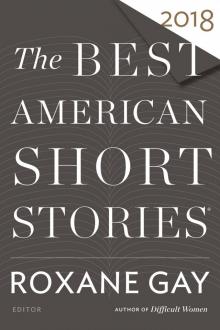 The Best American Short Stories 2018
The Best American Short Stories 2018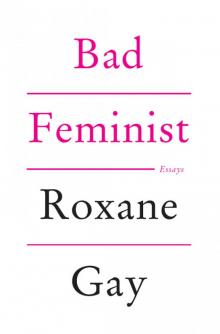 Bad Feminist
Bad Feminist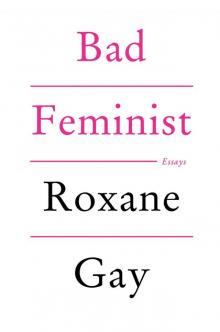 Bad Feminist: Essays
Bad Feminist: Essays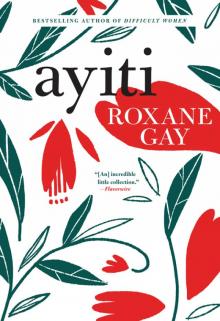 Ayiti
Ayiti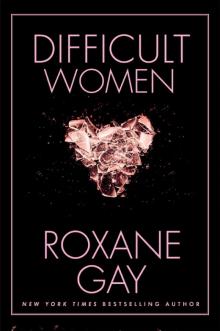 Difficult Women
Difficult Women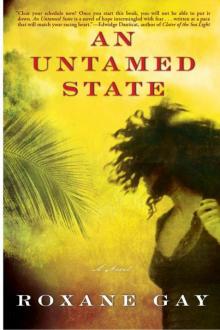 An Untamed State
An Untamed State Hunger
Hunger